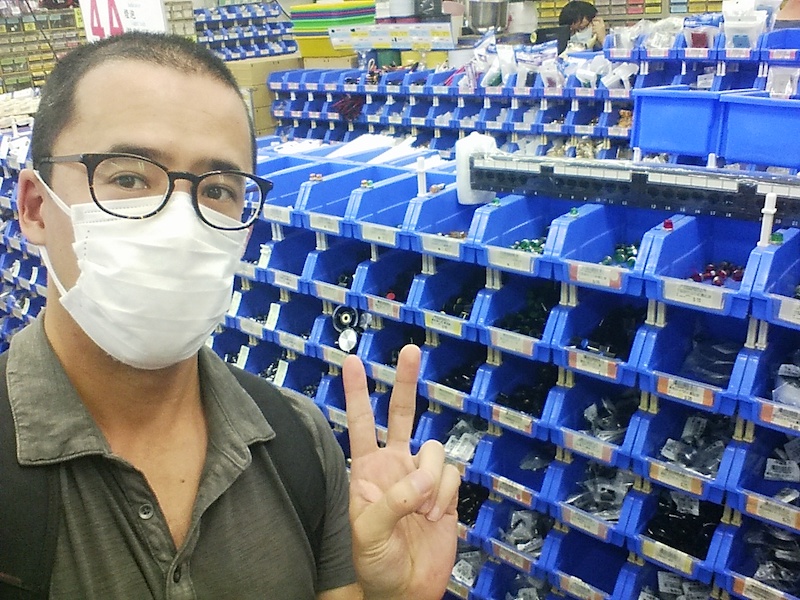Online retail empowerment
When I first moved to Taiwan, I was excited about all of the manufacturing tools and capabilities here to discover. Exports make up 70% of GDP, largely consisting of electronics, machine tools, various plastics, and the world’s most delicious silicon wafers. I was sure there’d be a ton of specialized suppliers and I’d soon be swimming in useful equipment, various materials, and perhaps even be commissioning small fabrication jobs at neighborhood metalworking shops, etc.
My hopes were further raised when, as soon as I got out of arrival quarantine in March, I discovered the Guang Hua Digital Plaza electronics market in Taipei and could evaluate dozens of potentiometers for knob feel (try that on a website):

Unfortunately, as I started to work on my projects and actually need specific things, I immediately ran into limits.
For example, to debug my touchpad I needed an oscilloscope. Based on the wisdom of the EEVblog forum, I sought a $500 Siglent 4-channel scope. Although Amazon would ship it to Taiwan for an extra $100 and two weeks, I wanted it sooner so I figured I’d look locally.
Despite their incredibly dense, animated-classifieds graphic design:

none of the local online retailers stocked oscilloscopes, so I went back to Guang Hua. After an afternoon in the shops/stalls, the closest I found there was an old man in the corner of the 4th floor tending to (living in?) a cave of yellowed-beige analog scopes from the 90’s. He shook his head solemnly at my phone when I showed him my desires, but also made no effort to sell me his wares (which looked so dated and useless for electronics work that I can only assume were now serving some vital role in a tax avoidance scheme or audiophile religious ceremony).
Dejected, I emailed Siglent (the Chinese scope manufacturer), who redirected me to the single Taiwanese distributor, with whom I had a week-long back-and-forth as we collaborated on several “unknown server error” e-commerce attempts together. Eventually (more than two weeks), a package was delivered to my building addressed to 美國人 (“the American”, my newly adopted “please enter valid characters only” e-commerce name) and I’d paid $647 for a $500-with-free-overnight-prime-shipping oscilloscope.
Ever optimistic, I hoped this might be a one-off having to do with Siglent being a relatively new Chinese manufacturer, but to my dismay this story has repeated several times now as I’ve tried to buy specific (but not rare!) items. Most recently: The decade-old-but-still-best sub-$1000 LCR meter, the Taiwan-made DE-5000, I failed to find locally (the manufacturer never got back to me) and, having learned my lesson, ended up buying via Amazon from a third-party seller in Japan.
I say this not (entirely) to complain, but because I never fully appreciated online retail when I lived in the US. Sure, I knew my foreign-friends would upgrade their laptops and iPhones when visiting America because of the larger selection and cheaper prices, but I never considered how much my own productivity and creative output benefited from the “American consumerism” environment.
I’ve only worked professionally as a software developer, so pretty much everything I’ve learned about materials and industrial design has come from:
- Watching people work on YouTube.
- Ordering the supplies they list underneath their videos.
- Trying myself.
It’s amazing, a sock puppet will teach you how to make silicone molds, a silent set of hands will cast 3d prints into metal parts in a backyard, and a machinist will let you watch them handcraft a wildly ornate playing card press.
Sure, for most viewers this is probably just entertainment, a different flavor of those “factory tour” shows. (Aside: In that genre, check out Japan Science and Technology Agency’s The Making which actually tries to explain how things are made, unlike American TV’s vapid “machines go fast, wow that’s a lot of corn flakes”; also, since we can’t read the titles my partner and I have great fun guessing what each episode is actually about.)
But for those of us who want to learn the craft, such videos are invaluable. Not just because we can watch people work, but because they’ll “leave a link in the description” to the various specialized tools and raw materials. This does wonders for accessibility: One can literally watch a video on Thursday about sewing a leather wallet or casting a resin figurine and have all of the necessary supplies delivered for a weekend of creative exploration.
I offer this perspective as a counterpoint to various hot takes. It’s easy to dunk on “consumerism” in the abstract; to decry anonymous online shopping as an escape for antisocial nerds; overnight shipping as the epitome of laziness, and to complain how the Internet is destroying mom-and-pop stores.
I remember trying to buy material from a mom-and-pop steelyard in my 20’s: I nervously wandered through an industrial yard dodging forklifts and as I entered the office the staff all looked up at me in unison. When I asked for “uh, ½ inch L-shaped steel”, they turned to each other and started joking about me! To my face!
How was I supposed to know to ask for “8 lengths pickled and oiled half angle iron” (or whatever the hell they called it)? It sucked!
And, yeah, I get it — they’re selling a building’s worth of steel at a time, why should they care about some ding-dong kid trying to MIG-weld themselves a terrarium?
But if you add up the long tail of small customer ding-dongs around the country, it’s feasible to run businesses like OnlineMetals.com (to sell them raw stock), SendCutSend (to laser cut metal), and OSHPark (to make them circuit boards).
Such websites make accessible to amateurs (and, hell, to women) the tools and materials previously available only to professional buyers at large firms. When I spend hours cluelessly browsing McMaster-Carr, no one there gets annoyed or makes fun of me to my face.
I strongly agree with Dan Wang that:
[T]echnology ultimately progresses because of people and the deepening of the process knowledge they possess.
I can’t speak about countries and firms, but as an individual with a liberal-arts physics degree and career in computing, YouTube and e-commerce are the reason why I have any firsthand process knowledge about CNC machining, PCB design, woodworking, etc.
Sure, online video and subreddits aren’t the optimal way to learn a craft. (Much less develop taste — epoxy-river tables aren’t the pinnacle of furniture design!) Of course I’d learn much more if I traveled up distant mountains and prostrated myself for the honor of sweeping some master craftsperson’s workshop floor or otherwise spent years working full-time as a tradesperson.
Similarly, online shopping isn’t always going to be the ideal shopping experience.
Last week I went to the Yongle Fabric Market to explore materials for an upcoming project. For this task, it was far superior than anything I could’ve done online. I could quickly see and touch lots of materials:

There are of course tons of social and logistical benefits from, uh, being in the same place as your trading partners.
However, markets benefit from increasing-returns-to-scale: More participants means better selection and more liquidity. The bigger it gets, the more useful a market is to everyone in it.
Given these two properties — benefits from co-location and increasing returns to scale — the equilibrium tends towards a single physical market for some field, consolidating the best prices, selection, process knowledge / expertise, etc.
In electronics, this is Shenzhen. In websites, this is Silicon Valley. In fashion, this is Milan (or New York or Paris — sorry, not my expertise).
For everyone outside of those places, the Internet is the best alternative by virtue of, well, being everyone’s best alternative to moving to Shenzhen, Milan, etc.
Living in the US was like living in “downtown Internet”, with lots of great stuff within a short walk (er, overnight shipping). Now that I’m in Taiwan, it feels like a 45 minute commute to the Internet — it’s mostly still accessible, but takes more time and deliberate effort.
So, my American friends, next time you unwrap some amazing new tool on your workshop table, appreciate what you’ve got and wish some customs-clearing luck to your fellow aspiring-craftsperson in Taiwan, “美國人”.
Misc. things
In talking with several of y'all it’s come to my attention that I was too subtle when I wrote about moving to Taiwan, so I’ll be as blunt as I can now: You still move to Taiwan. Yes, even you Americans that no one else wants right now. It costs $300, takes a month for paperwork, and once granted you can show up anytime (no arrival deadline). It’s a very cheap personal hedge against pandemics/fascism, is all I’m saying. Newsletter reader Wesley wrote up details.
Any of y'all familiar with small / delicate movement mechanisms (think watches) built using PCBs with minimal external components? These open source flexible PCB actuators and motors are facinating; what else has been done in this space? Could one control a floating compass needle floating on oil above a PCB generating an electromagnetic field. Yes, I’m daydreaming about a wrist-watch-sized Clock Clock.
Over the past month I’ve learned too much about the Autodesk Inventor and KiCAD APIs, so if any of y'all need help duct-taping those programs, hit me up.
Ever wonder about what it’s like to setup an espresso machine factory? This forum thread is for you.
Tsugite: Interactive Design and Fabrication of Wood Joints. I will not get a CNC machine for the 2 square meter clothes-drying balcony on my 11th floor apartment, I will not get a CNC machine…
Previously we saw the Ressence oil-filled watch but if $50k is too steep, you can also mod your favorite Casio for the same visual effect.
The dollar is a unit of economic value that, arguably, must be defined/managed like we do for kilograms and seconds.
Spectacular 3d-printed flight simulator joystick built using hall-effect sensors.
A Korean presidential contender supports a UBI and land value tax: “The problem of unearned income must be solved to build a ‘normal’ society where labor is respected and people are assured their share in accordance with their contributions. The biggest issue is a sharp increase in unearned incomes from lands and real estates.”
“Who wants to sell all their stuff and rent it back from giant corporations? But in another sense, it’s part of the process of economic growth. All gains from trade can be described this way: any time you buy something rather than making it yourself, you’re “renting” the fixed assets required to make it.”
Demo of various laser-cut flextures. See also Dan Gelbart’s flexture tutorial.
Calculation View: multiple-representation editing in spreadsheets.
“I think it would be difficult for nuclear to catch up, given that at the current trajectory solar will meet worldwide demand by about 2030, and new nuclear plant construction takes about a decade.”
A brief overview of SAT vs. SMT and how solvers are implemented.
Ten kinetic sculptures by Anne Lilly.